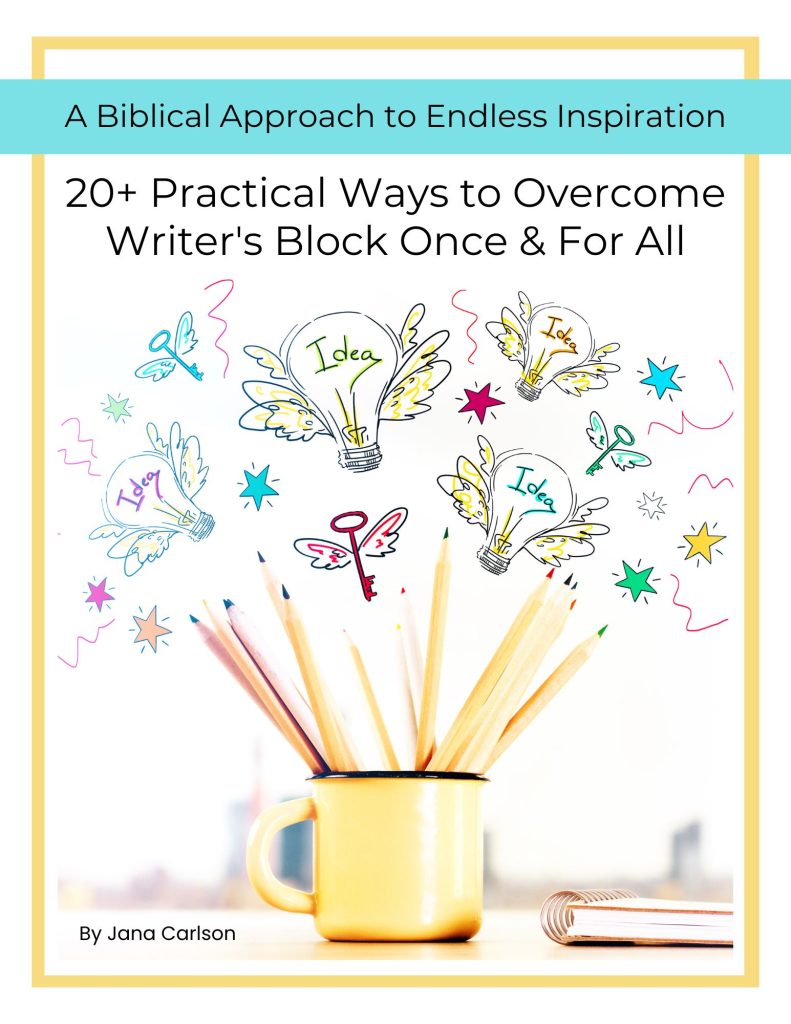My darkest day as a writer began in my 11th-grade English literature class. Mr. Ray quietly wove between the rows of desks, returning the most important writing assignment of our lives to date. We’d handed in our papers weeks ago, but the 20-page essay was worth nearly 50% of our final mark that year, so Mr. Ray had taken his time thoughtfully grading our papers.
Throughout my school years, I relished any assignment that allowed me to brandish my pen creatively. With little effort, I submitted papers filled with words I loved and usually received them back with a note of affirmation from my smiling teachers. That day in Mr. Ray’s class, I appeared nonchalant on the outside as I casually chatted with a friend, but I kept an eye on Mr. Ray as anticipation vibrated from my toes to my tresses. What accolades would I receive this time?
If only I had noticed how Mr. Ray avoided eye contact when he slipped my essay in front of me. It might have softened the blow. But I didn’t notice. As he approached my desk, I fixed my gaze on the essay in his hands, eager to feast on the sweetness of his praise.
My erroneous expectancy gave way to utter devastation. Emblazoned on the top right corner of the page was the red mark of shame—an “F”. Aghast, I sat in a daze throughout the class, deaf to any spoken word and blind to anything but the bold declaration of my failure taunting me from the paper on my desk.
The bell rang and my classmates quickly filed out of the room. Grasping my paper—now smudged by angry tears—I stumbled toward Mr. Ray and squeaked out a pitiful, “Why?”.
His response changed my life. “Because I know you can do much better,” he said. “I read your essay and, compared to the others, it was good. But I suspect you whipped it up in a couple of hours the night before it was due, and I want more from you. You’re an excellent writer, and I want to see you push yourself. I want you to write the best essay you can.”
Mr. Ray graciously granted me an extension and imparted a few practical suggestions to improve my work. For the next few days, I spent every spare moment rewriting my essay, implementing his suggestions, and crafting what I hoped would be a masterpiece.
As I handed Mr. Ray the fruit of my labor, I knew it was my best work. He would probably smile as he read it, and he’d express his pleasure in red ink—witty words and congratulations intended to make me smile. But it didn’t matter anymore. I was satisfied. Mr. Ray had pushed me beyond my limits and I had survived—no, thrived. I had dug deeper, thought longer, and written harder than ever before, and I had found the process intensely gratifying. I wanted to experience it again.
The Power of Mentorship
Three decades later, I think about Mr. Ray almost every day. My experience with him in 11th grade was the catalyst for a new way of writing—one involving the influence and expertise of others. Over time, I discovered the power of mentorship to transform my writing and saturate my writing experience with a richness that doesn’t exist in isolation.
To give you an idea of how this plays out in my writing life today:
- Amy Simon mentored me through the process of identifying my message and my readers—something I didn’t know I needed, yet it became a pivotal event in my writing career and prompted me to launch janacarlson.com.
- Cara Ray mentored me through the exhausting process of writing the copy for my website. She gently coached me through the challenge of seeing my website through the eyes of my reader and encouraged me through the discomfort of having to write about myself.
- Other mentors continually shepherd me in the craft of writing and anything related to it, including the emotional highs and lows, and the frustrations and mysteries of the technical stuff. They challenge me to do better and to rightly handle the Word of God while inspiring me to savor the writing process from start to finish.
Without these writing mentors, I would not be the writer I am today. I doubt I’d have my website. I likely wouldn’t have a full-time writing career as a freelancer. And I certainly wouldn’t enjoy the daily challenge of the blank page as much as I do now.
3 Compelling Reasons Why Every Christian Writer Needs a Mentor
Are you a Christian writer without a mentor? God’s Word provides plenty of proof of the value of mentorship. Here are three convincing reasons to actively pursue mentorship in your writing, for God’s glory and the good of others.
1. There’s too much information to sift through alone.
For years I floundered in my efforts to improve my writing and establish my place as a Christian writer online. Tossed to and fro by the abundance of expert advice resulting from my ambitious research, I tried and failed at countless activities that didn’t work for me or profited little. I wasted my time, money, and energy. The advice I found on Google might work for some people, but I needed answers specifically for me.
Proverbs 11:4 says, “Where there is no guidance, a people falls, but in an abundance of counselors there is safety.” Connecting with mentors who specialize in the areas where I’m weak put an end to my futile experimentation. I received clear direction and guidance that helped me maximize my time, save my money, and get to where I needed to go.
2. We make mistakes.
My friend says that the biggest room in her house is the room for improvement. I can relate. Even professional Christian writers are fallible human beings. We make spelling mistakes and grammatical errors. When we write from the heart, we struggle to take a step back and see the page through the eyes of a reader. We complicate things and sometimes even write words that are untrue or imply an inappropriate tone. Worse, we can be hypocritical, failing to live for God’s glory as we attempt to write for his glory.
We need accountability. As Christian writers, we need mentors to come alongside us and keep us from sliding off our path. Our mentors know how to gently tell us the truth that hurts because they know it’s necessary to fulfill our call to write for God’s glory. Mentors like these are God’s provision. As it says in Proverbs 27:6–9, ”Faithful are the wounds of a friend… and the sweetness of a friend comes from his earnest counsel.”
3. Riding a roller coaster is better with someone beside you.
The life of a Christian writer is a wild journey of emotion. We can wrestle with imposter syndrome, experience mountaintop views when our work is published, battle discouragement after rejection, and grin with gratitude when a reader expresses appreciation for our work—all in a single day. It can be exhausting.
A godly mentor reminds us why we do what we do. She helps us discern truth when we’re tempted to believe lies. She rejoices when we rejoice, and weeps when we weep (Romans 12:15). Like the companion described in Ecclesiastes 4:9–12, a mentor can lift us up when we fall and keep us warm in the cold of a writing winter. When writer’s block paralyzes our pens, our mentors inspire us to keep going.
Mentorship for Christian Writers
Continually, I encounter Christian writers who diligently work to use their gift of words for God’s glory. Still, they’re floundering—overwhelmed by information and advice, frustrated by all the time and energy they put into their work with seemingly meager results. They want their words to connect with readers and to have an eternal impact, but the nagging sense that they’re missing something lingers, causing discouragement and doubt in their call to write.
Does this sound familiar to you? It does to me. I fit that description years ago, but my experience is much different today.
When Mr. Ray gave me an “F” on my essay, and then offered wise counsel and practical suggestions to improve my work, I got a taste of something precious—like a glimpse of hidden treasure, available to anyone willing to follow the map. His mentorship gave me direction and propelled me toward God’s call on my life. I sought out mentors for every stage of my writing life since then, and I cannot fathom how I could write without their clear, compassionate shepherding.
That’s why I’ve partnered with Cara Ray and Amy Simon to provide a mentorship program just for you—The 2:2 Launch Lab. Mentorship changed our lives, and we know it will change yours. We want to save you the time, money, and frustration that we all wasted on our journey to launching a God-glorifying writing platform. We’ll come alongside you, share what we’ve learned, and help you find a clear path to fulfilling your call to write while considering your lifestyle, personality, goals, and the truth of God’s Word.
UPDATE: To make our resources and teaching accessible to more people, we’ve replaced the 2:2 Launch Lab with the Launch Your Writing Platform Course.


